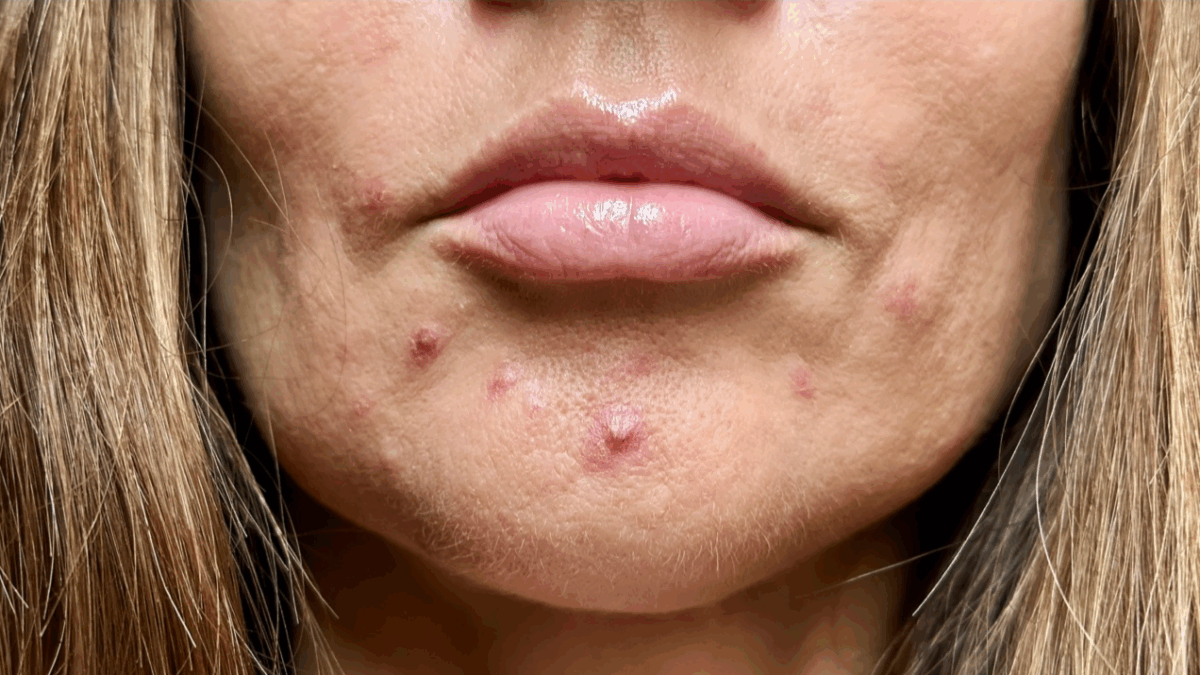Month: August 2024
Middle Age Acne: Causes, Treatments, and Skincare Tips

Middle age is a time of life often associated with wisdom, experience, and self-assurance. However, for many individuals in their 40s and 50s, it can also bring unexpected challenges in the form of acne. While acne is commonly associated with adolescence, it can persist or reappear in middle age, leading to frustration and concerns about skincare. In this article, we will delve into the causes of middle age acne, effective treatments, and essential skincare tips to help you manage and combat this common skin condition.
Understanding Middle Age Acne
Acne is a skin condition characterized by the occurrence of pimples, blackheads, and cysts on the face, neck, chest, and back. While acne is typically associated with hormonal changes during puberty, it can also affect individuals in their middle age due to various factors. Common causes of middle age acne include:
1. Hormonal Changes: Fluctuations in hormone levels during perimenopause and menopause can trigger acne breakouts in middle-aged individuals.
2. Stress: High levels of stress can contribute to hormonal imbalances and inflammation, leading to acne flare-ups.
3. Skincare Products: The use of harsh or comedogenic skincare products can clog pores and exacerbate acne in middle-aged skin.
4. Diet: Certain foods, such as dairy, high-glycemic index foods, and processed sugars, can worsen acne in some individuals.
Effective Treatments for Middle Age Acne
1. Topical Treatments: Over-the-counter or prescription topical treatments containing ingredients like benzoyl peroxide, salicylic acid, or retinoids can help unclog pores and reduce acne inflammation.
2. Oral Medications: In severe cases, dermatologists may prescribe oral medications such as antibiotics, hormonal therapies, or isotretinoin to treat persistent acne.
3. Professional Treatments: Procedures like chemical peels, microdermabrasion, or laser therapy can help improve acne and scarring in middle-aged individuals.
4. Holistic Approaches: Incorporating stress-reducing activities, a balanced diet, and regular exercise can support overall skin health and reduce acne flare-ups.
Skincare Tips for Managing Middle Age Acne
1. Gentle Cleansing: Use a gentle, non-comedogenic cleanser to remove dirt, oil, and makeup without stripping the skin of its natural oils.
2. Moisturize: Choose a lightweight, non-comedogenic moisturizer to hydrate the skin without clogging pores.
3. Sun Protection: Wear a broad-spectrum sunscreen daily to protect the skin from UV damage and prevent post-inflammatory hyperpigmentation.
4. Avoid Touching or Picking: Refrain from touching or picking at acne lesions to prevent further irritation and scarring.
Embracing Healthy Skin in Middle Age
While dealing with acne in middle age can be challenging, it is essential to approach skincare with patience, consistency, and a positive mindset. By understanding the causes of middle age acne, seeking effective treatments, and adopting a personalized skincare routine, you can effectively manage and improve your skin health. Remember, everyone’s skin is unique, so it may take time to find the right combination of products and treatments that work for you.
In conclusion, middle age acne is a common skin concern that can impact individuals’ confidence and well-being. By taking proactive steps to address the underlying causes, seek professional guidance, and practice consistent skincare habits, you can achieve clearer, healthier skin and embrace your middle age with confidence and radiance.
Remember, healthy skin is a reflection of your overall well-being and self-care. Embrace your skin journey with patience and self-love.
Trying to Conceive and Cosmetic Injections: Understanding the Impact on Fertility

As more individuals explore cosmetic procedures to enhance their appearance and boost their confidence, questions arise regarding the impact of cosmetic injections on fertility, especially for those who are trying to conceive. Cosmetic injections, such as Botox and dermal fillers, have become increasingly popular for addressing signs of aging and enhancing facial features. In this article, we will delve into the relationship between trying to conceive and cosmetic injections, examining potential concerns, considerations, and expert insights to help individuals make informed decisions about their fertility journey and cosmetic procedures.
The Impact of Cosmetic Injections on Fertility
Cosmetic injections, including Botox (botulinum toxin) and dermal fillers, are commonly used to reduce wrinkles, enhance facial contours, and rejuvenate the skin. While these procedures are generally considered safe and effective for cosmetic purposes, questions arise about their potential impact on fertility when individuals are actively trying to conceive. Here are some key considerations to keep in mind:
1. Lack of Comprehensive Research: Currently, there is limited scientific research specifically addressing the effects of cosmetic injections on fertility. As a result, it can be challenging to definitively determine the impact of these procedures on reproductive health and fertility outcomes.
2. Potential Systemic Effects: Some studies suggest that cosmetic injections, particularly Botox, may have systemic effects beyond the intended cosmetic benefits. It is important to consider how these systemic effects could potentially influence fertility and reproductive health.
3. Hormonal Changes: Cosmetic injections, such as Botox, work by temporarily paralyzing the facial muscles to reduce the appearance of wrinkles. While the localized effects are well understood, the potential impact of these treatments on hormonal balance and reproductive function requires further investigation.
Expert Insights and Recommendations
Consulting with a qualified healthcare provider, such as a dermatologist, cosmetic surgeon, or fertility specialist, is essential for individuals who are considering cosmetic injections while trying to conceive. Here are some expert insights and recommendations to consider:
1. Timing of Cosmetic Procedures: If you are actively trying to conceive or planning to start a family in the near future, it may be advisable to postpone cosmetic injections until after achieving your fertility goals. This approach allows you to focus on optimizing your reproductive health without potential concerns about the impact of cosmetic procedures.
2. Consultation with Healthcare Providers: Before undergoing any cosmetic injections, discuss your fertility intentions with your healthcare providers. They can provide personalized guidance, address any concerns, and offer recommendations based on your individual health profile and fertility goals.
3. Alternative Cosmetic Treatments: If you are concerned about the potential impact of cosmetic injections on fertility, consider exploring non-invasive or topical cosmetic treatments that do not involve injectables. These alternatives may offer cosmetic benefits without raising concerns about fertility.
4. Comprehensive Health Assessment: Prior to undergoing any cosmetic procedure, it is important to undergo a comprehensive health assessment to ensure that you are in good overall health, including reproductive health. This evaluation can help identify any potential risks or considerations related to fertility and cosmetic injections.
5. Open Communication and Informed Decision-Making: Maintain open communication with your healthcare providers throughout the decision-making process. Be proactive in seeking information, asking questions, and making informed decisions that align with your fertility goals and overall well-being.
The relationship between trying to conceive and cosmetic injections is a complex and nuanced topic that requires careful consideration and individualized guidance. While cosmetic procedures can offer aesthetic enhancements and boost self-confidence, it is important to prioritize reproductive health and fertility goals, especially for individuals actively pursuing pregnancy. By consulting with healthcare providers, staying informed, and making decisions that align with your fertility aspirations, you can navigate the intersection of cosmetic injections and fertility with confidence and clarity. Remember that your reproductive health is a priority, and seeking expert guidance is essential in ensuring that your fertility journey is supported and optimized.
“The Importance of Preconception Genetic Screening: Understanding Your Family’s Genetic Health”

Preconception genetic screening is a valuable tool that offers insight into potential genetic risks that may impact a couple’s ability to conceive or the health of their future children. By undergoing genetic testing before conception, individuals can identify genetic conditions that may be passed down to their offspring and make informed decisions about family planning. In this article, we will explore the importance of preconception genetic screening, the benefits it offers, and how it can empower individuals to make proactive choices for their family’s genetic health.
Understanding Preconception Genetic Screening
Preconception genetic screening involves testing individuals or couples for specific genetic mutations or conditions that could be passed on to their children. This type of testing can identify carriers of genetic disorders, assess the risk of passing on certain conditions, and help couples understand their genetic compatibility. By uncovering potential genetic risks before pregnancy, individuals can make informed decisions about family planning and take proactive steps to mitigate these risks.
Benefits of Preconception Genetic Screening
1. Early Identification of Genetic Risks: Preconception genetic screening allows individuals to identify genetic risks early on, providing an opportunity to assess the likelihood of passing on genetic conditions to their children.
2. Informed Family Planning: By understanding their genetic risks, individuals can make informed decisions about family planning, including exploring options such as in vitro fertilization (IVF) with preimplantation genetic testing or adoption.
3. Peace of Mind: Knowing the results of preconception genetic screening can provide peace of mind and alleviate concerns about the potential impact of genetic conditions on future children.
4. Risk Reduction Strategies: In cases where genetic risks are identified, individuals can work with healthcare providers to develop risk reduction strategies, such as genetic counseling, prenatal testing, or exploring assisted reproductive technologies.
Empowering Individuals Through Genetic Knowledge
Preconception genetic screening empowers individuals with knowledge about their genetic health and the potential risks they may carry. This information allows individuals to take proactive steps to safeguard their family’s genetic well-being and make informed decisions about their reproductive future. Here are some key ways in which preconception genetic screening can empower individuals:
1. Personalized Risk Assessment: By undergoing genetic screening, individuals receive a personalized risk assessment based on their genetic profile. This information enables them to understand their specific genetic risks and make decisions tailored to their unique circumstances.
2. Family Planning Options: Armed with knowledge about their genetic risks, individuals can explore various family planning options that align with their values and preferences. This may include pursuing fertility treatments, choosing donor gametes, or considering adoption.
3. Enhanced Communication: Preconception genetic screening encourages open communication between partners about their genetic health and family planning goals. This shared understanding can strengthen the bond between partners and facilitate informed decision-making.
4. Proactive Health Management: For individuals identified as carriers of genetic conditions, preconception genetic screening empowers them to take proactive steps to manage their health and reduce the risk of passing on genetic disorders to their children.
Preconception genetic screening is a valuable tool that empowers individuals to make informed decisions about their family’s genetic health and reproductive future. By undergoing genetic testing before conception, individuals can identify potential genetic risks, explore family planning options, and take proactive steps to safeguard their family’s well-being. With knowledge comes empowerment, and preconception genetic screening offers individuals the opportunity to take control of their genetic health and create a path forward that aligns with their values and aspirations for their family. By embracing the insights gained from genetic screening and working collaboratively with healthcare providers, individuals can navigate their reproductive journey with confidence, clarity, and a commitment to ensuring the best possible outcomes for their future children.
Lương Y Nguyễn Thành Danh

Tôi là Nguyễn Thành Danh, truyền nhân đời thứ 4 của đại gia đình Lương y Nguyễn Văn Thơm, một dòng họ có truyền thống lâu đời về Đông y và tâm huyết với việc chữa lành xương khớp. Sinh ra và lớn lên tại TP. Hồ Chí Minh, tôi sớm được tiếp xúc với những bài thuốc Nam gia truyền, được tận mắt chứng kiến hiệu quả kỳ diệu của y học cổ truyền trong việc chăm sóc sức khỏe con người. Với tôi, được tiếp nối truyền thống gia đình, đồng thời mang đến giải pháp chăm sóc sức khỏe toàn diện cho cộng đồng là niềm tự hào và trách nhiệm to lớn.
Hành Trình Đến Với Đông Y – Gọi Là Duyên Số
Hành trình đến với Đông y của tôi bắt đầu từ những câu chuyện được nghe kể từ thuở ấu thơ. Tôi lớn lên trong mùi thơm của thảo dược, trong tiếng giã thuốc đều đều và những lời khuyên ân cần của ông cha về y đức, về bài thuốc gia truyền. Chính những điều giản dị ấy đã nuôi dưỡng trong tôi niềm đam mê với y học cổ truyền, thôi thúc tôi theo đuổi con đường trở thành một Lương y, kế thừa và phát huy di sản quý báu của dòng họ.
Ứng Dụng Kiến Thức Hiện Đại, Phát Triển Đông Y Truyền Thống
Sau khi tốt nghiệp Đại học, tôi quyết định dành trọn tâm huyết cho Dược Bình Đông – một trong những công ty Dược phẩm hàng đầu Việt Nam. Tại đây, với vai trò là Cố vấn chuyên môn, tôi có cơ hội được ứng dụng kiến thức, kinh nghiệm được truyền dạy từ gia đình kết hợp với những nghiên cứu khoa học bài bản để tham gia vào quy trình nghiên cứu và phát triển sản phẩm.
Tôi luôn tâm niệm rằng, mỗi sản phẩm ra đời không chỉ đơn thuần là thuốc, mà còn là sự gửi gắm tâm huyết, là kết tinh của truyền thống y học cổ truyền và công nghệ hiện đại. Tôi đã trực tiếp tham gia vào quá trình nghiên cứu và phát triển thành công nhiều sản phẩm, trong đó phải kể đến:
- Thảo Linh Tiên Bình Đông: Là sản phẩm kết hợp hài hòa giữa các loại thảo dược quý như Dây đau xương, Đỗ Trọng, Ngưu Tất, Độc Hoạt,… mang đến giải pháp toàn diện giúp hỗ trợ điều trị các vấn đề về xương khớp, hỗ trợ giảm đau nhức, tê bì chân tay do viêm khớp, thoái hóa khớp, thoái hóa cột sống,…
- Dưỡng Cốt Bình Đông: Sản phẩm được nghiên cứu kỹ lưỡng với công thức độc đáo, giúp hỗ trợ mạnh gân cốt, tăng cường sự dẻo dai cho khớp, hỗ trợ giảm đau nhức do viêm khớp, giúp người bệnh dễ dàng vận động và nâng cao chất lượng cuộc sống.
Chia Sẻ Kiến Thức, Lan Tỏa Giá Trị Y Học Cổ Truyền
Bên cạnh công việc nghiên cứu và phát triển sản phẩm, tôi còn là một người yêu thích viết lách. Tôi mong muốn được chia sẻ những kiến thức bổ ích về Đông y, về cách chăm sóc sức khỏe xương khớp đến với đông đảo người dân. Bạn có thể tìm đọc những bài viết và địa chỉ của tôi tại:
- Địa chỉ: 43/9 Mễ Cốc, Phường 15, Quận 8, Thành phố Hồ Chí Minh
- Hotline: 028.39.808.808
- Email: [email protected]
- Website: https://www.binhdong.vn/author/nguyenthanhdanh/
- Facebook: https://www.facebook.com/profile.php?id=61559319613959
- Instagram: https://www.instagram.com/thanhdanhdbd/
- Threads: https://www.threads.net/@thanhdanhdbd
- Linkedin: http://www.linkedin.com/in/nguyen-thanh-danh
- Solo.to: https://solo.to/nguyenthanhdanh
Đồng Hành Cùng Bạn Chăm Sóc Sức Khỏe Xương Khớp
Tôi tin rằng, bằng sự tận tâm với nghề, bằng kiến thức và kinh nghiệm của bản thân, tôi có thể góp phần nhỏ bé của mình vào việc gìn giữ và phát huy giá trị y học cổ truyền Việt Nam, mang đến cho cộng đồng những sản phẩm chăm sóc sức khỏe chất lượng, hiệu quả.
Hãy liên hệ với tôi nếu bạn:
- Cần được tư vấn về các vấn đề về xương khớp.
- Muốn tìm hiểu thêm về các phương pháp điều trị Đông y.
- Quan tâm đến các sản phẩm bảo vệ sức khỏe xương khớp.
Tôi luôn sẵn sàng lắng nghe và đồng hành cùng bạn trên hành trình chăm sóc sức khỏe!
“Managing Persistent Morning Sickness Throughout Pregnancy: Tips for Relief and Support”

Experiencing morning sickness is a common and often challenging aspect of pregnancy for many expectant mothers. While morning sickness typically subsides after the first trimester, some women may continue to experience nausea and vomiting throughout the entire 40 weeks of pregnancy. In this article, we will explore the causes of persistent morning sickness, offer tips for managing symptoms, and provide support for expectant mothers who are navigating this prolonged experience.
Understanding Morning Sickness Throughout Pregnancy
Morning sickness, characterized by nausea and vomiting, is a common symptom experienced by many pregnant women, especially during the early stages of pregnancy. While it is often referred to as “morning” sickness, the symptoms can occur at any time of the day. For some women, morning sickness may persist beyond the first trimester and continue throughout the entire duration of pregnancy. Several factors can contribute to persistent morning sickness:
1. Hormonal Changes: Fluctuations in hormone levels, particularly human chorionic gonadotropin (hCG) and estrogen, play a significant role in triggering morning sickness. These hormonal changes can impact the digestive system and contribute to feelings of nausea and vomiting.
2. Increased Sensitivity: Some women may have a heightened sensitivity to certain smells, tastes, or textures during pregnancy, which can trigger or worsen morning sickness symptoms.
3. Gestational Factors: The size and position of the uterus as the pregnancy progresses can put pressure on the stomach and intestines, leading to digestive discomfort and nausea.
Tips for Managing Persistent Morning Sickness
1. Eat Small, Frequent Meals: Consuming small, frequent meals throughout the day can help prevent an empty stomach, which can exacerbate nausea. Opt for bland, easy-to-digest foods like crackers, toast, or rice.
2. Stay Hydrated: Dehydration can worsen morning sickness symptoms, so it is essential to stay hydrated by sipping water, herbal teas, or clear fluids throughout the day. Cold or sparkling water may be easier to tolerate.
3. Ginger: Ginger has natural anti-nausea properties and can help alleviate symptoms of morning sickness. Consider drinking ginger tea, eating ginger candies, or taking ginger supplements to ease nausea.
4. Rest and Relaxation: Fatigue and stress can exacerbate morning sickness, so prioritize rest and relaxation. Ensure you are getting adequate sleep, practice relaxation techniques like deep breathing or meditation, and consider gentle activities like prenatal yoga.
5. Acupressure Bands: Wristbands that apply pressure to specific acupressure points on the wrist have been found to help reduce nausea in some pregnant women. Consider using acupressure bands to alleviate morning sickness symptoms.
6. Consult Your Healthcare Provider: If you are experiencing persistent morning sickness that is significantly impacting your daily life and well-being, consult your healthcare provider. They can provide personalized recommendations, prescribe medication if necessary, and monitor your health and the health of your baby.
Support and Understanding for Expectant Mothers
Experiencing persistent morning sickness throughout pregnancy can be physically and emotionally challenging. It is important for expectant mothers to seek support, both from their healthcare providers and their support network. Here are some additional tips for navigating persistent morning sickness:
1. Open Communication: Share your experiences and concerns with your partner, family members, friends, and healthcare provider. Open communication can help you feel supported and understood during this challenging time.
2. Self-Care: Prioritize self-care practices that promote relaxation and well-being. Take breaks when needed, engage in activities that bring you joy, and seek moments of calm and tranquility.
3. Seek Peer Support: Connect with other expectant mothers who may be experiencing similar challenges. Online forums, support groups, or prenatal classes can provide a sense of community and understanding.
4. Mental Health Support: If persistent morning sickness is taking a toll on your mental health, consider seeking support from a mental health professional. Counseling or therapy can provide strategies for coping with stress and anxiety.
Managing persistent morning sickness throughout the entire 40 weeks of pregnancy can be a challenging journey for expectant mothers. By understanding the factors that contribute to persistent morning sickness, implementing practical tips for symptom management, and seeking support from healthcare providers and loved ones, expectant mothers can navigate this experience with resilience and care. Remember that every pregnancy is unique, and it is important to prioritize self-care, communication, and support to ensure your well-being and the well-being of your baby during this transformative time. With the right strategies and support in place, expectant mothers can find relief and comfort as they journey through pregnancy with strength and perseverance.
Teething and Colic: Understanding the Connection and Soothing Solutions

Teething and colic are two common challenges that parents face during their baby’s early months. Teething, the process of a baby’s first teeth breaking through the gums, can be a painful and uncomfortable experience for infants. On the other hand, colic refers to excessive crying and fussiness in a healthy baby, often without an obvious cause. While these two issues may seem unrelated, there is a growing body of research suggesting a potential connection between teething and colic. In this comprehensive guide, we will delve into the relationship between teething and colic, explore possible reasons for their correlation, and provide practical tips for soothing both teething pain and colic symptoms.
Teething and Its Effects on Babies
Teething typically begins around six months of age, although the timing can vary from one baby to another. As the baby’s teeth start to emerge, they may experience symptoms such as:
1. Irritability and fussiness
2. Drooling and increased saliva
3. Swollen and tender gums
4. Disrupted sleep patterns
5. Loss of appetite
The discomfort associated with teething can lead to increased crying and general distress in infants. Parents often seek ways to alleviate their baby’s teething pain and provide relief during this challenging time.
Understanding Colic and Its Symptoms
Colic is defined as episodes of excessive crying and fussiness in an otherwise healthy baby, typically lasting for several hours a day, several days a week. The exact cause of colic remains unclear, but factors such as gastrointestinal issues, immature digestive systems, and sensitivity to stimuli have been proposed as potential contributors. Common symptoms of colic include:
1. Intense crying that is difficult to soothe
2. Clenched fists and tense abdominal muscles
3. Difficulty feeding and sleeping
4. Frequent episodes of fussiness, especially in the late afternoon and evening
Colic can be distressing for both babies and parents, leading to feelings of helplessness and frustration. Finding effective strategies to calm a colicky baby is essential for promoting comfort and well-being.
The Potential Connection Between Teething and Colic
While teething and colic are often viewed as separate issues, some studies suggest a possible link between the two. Teething is known to cause discomfort and irritability in babies, which can exacerbate existing colic symptoms. The pain and inflammation associated with teething may contribute to increased fussiness and crying in colicky infants. Additionally, the disruption of the baby’s routine and sleep patterns during teething can further aggravate colic episodes.
Soothing Solutions for Teething and Colic
To help alleviate the discomfort of teething and colic, parents can consider the following soothing solutions:
1. Teething Remedies: Provide teething toys, chilled washcloths, or teething gels to help soothe sore gums and provide relief during teething episodes.
2. Gentle Massage: Use gentle circular motions to massage the baby’s gums and abdomen to alleviate teething pain and promote relaxation during colic episodes.
3. Warm Baths: A warm bath can help calm a fussy baby and provide a soothing environment to ease both teething and colic symptoms.
4. White Noise: Playing white noise or gentle music can help distract and calm a colicky baby, reducing crying and promoting relaxation.
5. Comfort and Cuddling: Offer comfort and reassurance through gentle rocking, swaddling, and cuddling to provide emotional support during teething and colic episodes.
Teething and colic are common challenges that parents navigate during their baby’s early months. While the relationship between teething and colic is still being studied, recognizing the potential connection can help parents better understand and address their baby’s needs. By incorporating soothing solutions and providing comfort during teething and colic episodes, parents can support their baby’s well-being and promote a sense of calm and security during these challenging times. Remember to consult with a healthcare provider or pediatrician for personalized advice and guidance on managing teething and colic symptoms in your baby.
By understanding the potential link between teething and colic and implementing effective soothing strategies, parents can navigate these challenges with patience and care, ensuring a smoother experience for both their baby and themselves. Embrace the journey of parenting with compassion and resilience, knowing that each phase, including teething and colic, is a valuable opportunity for growth and bonding with your little one.
“Unlocking Fertility: The Healing Power of Chinese Medicine in Enhancing Reproductive Health”

Chinese medicine has a long-standing reputation for its holistic approach to health and wellness. One area where Chinese medicine has gained significant attention is in the realm of fertility. Many individuals and couples struggling with fertility issues have turned to Chinese medicine as a natural and alternative way to enhance their reproductive health. In this article, we will delve into the fascinating world of Chinese medicine and its impact on fertility.
Understanding Chinese Medicine and Fertility
Chinese medicine is rooted in the principles of balance and harmony within the body. Traditional Chinese medicine (TCM) views the body as a complex system where energy, known as Qi, flows through meridians to maintain health. When there is an imbalance or blockage in the flow of Qi, it can lead to various health issues, including fertility problems.
The Role of Acupuncture in Fertility
Acupuncture, a key component of Chinese medicine, involves the insertion of thin needles into specific points on the body to stimulate energy flow and restore balance. In the context of fertility, acupuncture has been shown to be beneficial in regulating menstrual cycles, improving blood flow to the reproductive organs, and reducing stress levels – all of which can contribute to a healthier reproductive system.
Herbal Remedies for Fertility Support
In addition to acupuncture, Chinese herbal medicine plays a vital role in supporting fertility. TCM practitioners often prescribe customized herbal formulas tailored to an individual’s specific needs. These herbs are chosen for their ability to nourish the body, regulate hormone levels, and enhance reproductive function. Popular herbs used in fertility treatments include Dong Quai, Ginseng, and Goji Berries.
Diet and Lifestyle Recommendations
Chinese medicine emphasizes the importance of diet and lifestyle in maintaining overall health and fertility. TCM practitioners may recommend dietary changes, such as incorporating more warming foods and avoiding cold or raw foods, to support the body’s Qi and promote fertility. Lifestyle recommendations may include stress-reducing practices like meditation, yoga, and adequate rest.
The Mind-Body Connection
One of the unique aspects of Chinese medicine is its recognition of the mind-body connection in health. Emotional well-being is considered crucial for fertility, as stress and negative emotions can impact reproductive function. Practices like mindfulness, Qi Gong, and Tai Chi are often recommended to cultivate a calm and balanced state of mind.
Research and Success Stories
While more research is needed to fully understand the mechanisms behind Chinese medicine’s effects on fertility, there is a growing body of evidence supporting its efficacy. Many individuals and couples have shared success stories of overcoming fertility challenges with the help of Chinese medicine, highlighting its potential as a natural and safe option for enhancing reproductive health.
Chinese medicine offers a comprehensive and holistic approach to fertility that addresses the root causes of reproductive imbalances. By incorporating acupuncture, herbal remedies, dietary modifications, and lifestyle changes, individuals can support their fertility journey in a gentle and natural way. Whether used alone or in conjunction with conventional fertility treatments, Chinese medicine can be a valuable tool in promoting reproductive wellness and helping individuals achieve their dream of starting a family.
“Managing Heartburn During Pregnancy: Tips for Relief and Comfort”

Heartburn during pregnancy is a common and often uncomfortable symptom that many expectant mothers experience. As the body undergoes significant changes to accommodate the growing baby, hormonal fluctuations and pressure on the digestive system can lead to heartburn. In this article, we will explore the causes of heartburn during pregnancy, effective ways to manage it, and tips for finding relief and comfort.
Understanding Heartburn During Pregnancy
Heartburn, also known as acid indigestion or acid reflux, is characterized by a burning sensation in the chest or throat. During pregnancy, the hormone progesterone relaxes the muscles of the digestive tract, allowing stomach acid to flow back up into the esophagus. Additionally, the expanding uterus puts pressure on the stomach, further contributing to acid reflux symptoms.
Causes of Heartburn During Pregnancy
Several factors contribute to the development of heartburn in pregnant women. These include:
1. Hormonal Changes: Progesterone relaxes the lower esophageal sphincter, the valve that prevents stomach acid from entering the esophagus.
2. Pressure on the Stomach: As the uterus expands, it can push the stomach upward, leading to acid reflux.
3. Slower Digestion: Pregnancy hormones can slow down the digestive process, causing food to stay in the stomach longer and increasing the risk of acid reflux.
Managing Heartburn Symptoms
While heartburn during pregnancy can be uncomfortable, there are several strategies to help manage and alleviate symptoms:
1. Eat Small, Frequent Meals: Opt for smaller meals throughout the day to prevent overloading the stomach.
2. Avoid Trigger Foods: Spicy, acidic, and fatty foods can exacerbate heartburn symptoms. Limit intake of these trigger foods.
3. Stay Upright After Eating: Remain in an upright position for at least 1-2 hours after meals to allow gravity to help keep stomach acid down.
4. Sleep with Elevated Head: Elevate your head and upper body while sleeping to reduce the likelihood of acid reflux during the night.
5. Wear Loose Clothing: Tight clothing can put pressure on the abdomen, worsening heartburn. Opt for loose, comfortable attire.
Natural Remedies for Heartburn Relief
In addition to lifestyle modifications, there are natural remedies that can provide relief from heartburn during pregnancy:
1. Ginger Tea: Ginger has anti-inflammatory properties that can help soothe the digestive tract and alleviate heartburn symptoms.
2. Slippery Elm: Slippery elm is a herb known for its mucilage content, which can coat and protect the esophagus from excess stomach acid.
3. Chewing Gum: Chewing sugar-free gum after meals can stimulate saliva production, which helps neutralize stomach acid.
4. Apple Cider Vinegar: Despite its acidic nature, apple cider vinegar can help balance stomach acid levels and reduce heartburn.
Consulting Your Healthcare Provider
If you experience severe or persistent heartburn during pregnancy, it is essential to consult your healthcare provider. They can provide personalized recommendations and may prescribe safe medications to manage your symptoms effectively.
Heartburn during pregnancy is a common discomfort that many expectant mothers face. By understanding the causes of heartburn, making lifestyle adjustments, and incorporating natural remedies, you can effectively manage and alleviate symptoms. Remember to prioritize your comfort and well-being during this special time, and seek support from your healthcare provider if needed. With the right strategies in place, you can navigate heartburn during pregnancy with ease and focus on enjoying this transformative journey to motherhood.
“Overcoming Loneliness in Menopause: Strategies for Emotional Well-Being”

Menopause is a significant life transition that brings about physical, emotional, and hormonal changes for women. While menopause is a natural and inevitable phase in a woman’s life, it can also be accompanied by feelings of loneliness and isolation. The combination of hormonal fluctuations, physical symptoms, and societal expectations can contribute to a sense of disconnect and solitude during this period. In this article, we will explore the phenomenon of loneliness in menopause, its impact on women’s well-being, and practical strategies for addressing and overcoming feelings of isolation during this transformative stage.
Understanding Loneliness in Menopause
Loneliness in menopause can manifest in various ways, ranging from a sense of social isolation to emotional disconnection from others. Women experiencing menopause may feel a lack of understanding or support from their social circle, leading to feelings of loneliness and solitude. The hormonal changes associated with menopause, such as fluctuations in estrogen and progesterone levels, can also affect mood and emotional well-being, contributing to feelings of loneliness.
Impact of Loneliness on Women’s Well-Being
Loneliness during menopause can have a profound impact on women’s overall well-being and quality of life. Chronic feelings of isolation can lead to increased stress, anxiety, and depression, exacerbating existing menopausal symptoms such as hot flashes, mood swings, and sleep disturbances. Loneliness can also affect women’s self-esteem, confidence, and sense of purpose, further amplifying the challenges of navigating this transitional phase.
Strategies for Addressing Loneliness in Menopause
1. Seek Social Support: Connect with friends, family members, or support groups who understand and empathize with your menopausal experiences. Sharing your feelings and concerns with others can help alleviate feelings of loneliness and provide a sense of validation and understanding.
2. Prioritize Self-Care: Take time to care for your physical, emotional, and mental well-being during menopause. Engage in activities that bring you joy and relaxation, such as yoga, meditation, reading, or spending time in nature. Prioritizing self-care can help boost your mood and reduce feelings of loneliness.
3. Stay Active: Regular physical activity has been shown to improve mood, reduce stress, and enhance overall well-being. Consider incorporating exercise into your daily routine, whether it’s going for a walk, practicing yoga, or engaging in a fitness class. Physical activity can also provide opportunities for social interaction and connection.
4. Explore New Interests: Menopause can be a time of self-discovery and personal growth. Explore new hobbies, interests, or activities that ignite your passion and creativity. Engaging in new experiences can help broaden your social network and create opportunities for meaningful connections.
5. Practice Mindfulness: Mindfulness practices, such as meditation and deep breathing exercises, can help cultivate a sense of inner calm and presence. By focusing on the present moment and nurturing self-awareness, you can reduce feelings of loneliness and enhance emotional resilience during menopause.
6. Consider Therapy: If feelings of loneliness persist or significantly impact your well-being, consider seeking support from a therapist or counselor. Therapy can provide a safe space to explore and process your emotions, develop coping strategies, and gain valuable insights into managing loneliness during menopause.
Loneliness in menopause is a common and valid experience that many women navigate during this transformative phase of life. By acknowledging and addressing feelings of isolation, seeking social support, prioritizing self-care, and exploring new avenues for connection and growth, women can overcome loneliness and cultivate a sense of emotional well-being and resilience during menopause. Remember that you are not alone in your menopausal journey, and there are resources, support networks, and strategies available to help you navigate this period with grace, strength, and authenticity. Embrace this time of change as an opportunity for personal growth, self-discovery, and renewed connections that can enrich your life and well-being in profound ways.
Acne in Menopause: Tips for Clearer Skin in Your Transition Years

Menopause is a significant stage in a woman’s life marked by hormonal changes that can impact various aspects of health, including the skin. Acne, a common skin condition often associated with adolescence, can resurface during menopause due to fluctuations in hormone levels. In this article, we will delve into the causes of acne during menopause, explore effective strategies for managing and preventing breakouts, and provide valuable tips for achieving clearer skin during this transitional phase.
Understanding Acne in Menopause
Acne in menopause can be attributed to the hormonal shifts that occur as a woman’s body transitions out of the reproductive phase. During menopause, estrogen levels decline while androgen hormones, such as testosterone, may remain relatively stable or increase. This hormonal imbalance can lead to an overproduction of sebum, the skin’s natural oil, which can clog pores and contribute to the development of acne.
Common Types of Acne in Menopause
1. Hormonal Acne: Hormonal fluctuations can trigger inflammatory acne breakouts, commonly seen along the jawline, chin, and lower face.
2. Adult-Onset Acne: Some women may experience acne for the first time during menopause, often characterized by persistent, low-grade breakouts.
3. Cystic Acne: Deep, painful cysts can develop beneath the skin’s surface, leading to more severe and stubborn acne lesions.
Effective Strategies for Managing Acne in Menopause
1. Gentle Cleansing: Use a mild, non-abrasive cleanser to gently cleanse the skin without stripping its natural oils.
2. Moisturize: Opt for a lightweight, non-comedogenic moisturizer to keep the skin hydrated without clogging pores.
3. Exfoliation: Incorporate gentle exfoliation to remove dead skin cells and prevent pore blockages.
4. Spot Treatments: Use targeted treatments containing ingredients like salicylic acid or benzoyl peroxide to address acne breakouts.
5. Sun Protection: Apply a broad-spectrum sunscreen daily to protect the skin from UV damage and prevent post-inflammatory hyperpigmentation.
Natural Remedies for Acne Relief
1. Tea Tree Oil: Known for its antimicrobial properties, tea tree oil can help reduce acne-causing bacteria on the skin.
2. Aloe Vera: Aloe vera has soothing and anti-inflammatory properties that can calm redness and irritation associated with acne.
3. Green Tea: Green tea contains antioxidants that can help reduce inflammation and promote clearer skin.
4. Zinc Supplements: Zinc plays a role in skin health and may help regulate sebum production and reduce acne severity.
Lifestyle Tips for Clearer Skin
1. Healthy Diet: Incorporate a balanced diet rich in fruits, vegetables, whole grains, and lean proteins to support skin health.
2. Stress Management: Practice stress-reducing techniques such as meditation, yoga, or deep breathing exercises to minimize acne flare-ups.
3. Hydration: Drink an adequate amount of water daily to keep the skin hydrated and support its natural functions.
4. Sleep: Prioritize quality sleep to allow the skin to repair and regenerate, promoting a clearer complexion.
Consulting a Dermatologist
If acne persists or worsens despite home care measures, it is advisable to consult a dermatologist for personalized treatment recommendations. Dermatologists can assess your skin condition, prescribe medications or topical treatments, and offer professional guidance on managing acne during menopause.
Acne during menopause is a common skin concern that can be effectively managed with the right skincare routine, lifestyle adjustments, and natural remedies. By understanding the causes of acne in menopause and implementing targeted strategies for clearer skin, women can navigate this transitional phase with confidence and maintain a healthy complexion. Remember that each individual’s skin is unique, so it may take time to find the approach that works best for you. With patience, consistency, and expert guidance, achieving clearer skin during menopause is attainable, allowing you to embrace this new chapter with radiance and vitality.
